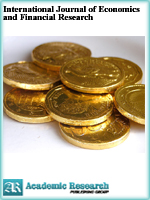International Journal of Economics and Financial Research
Online ISSN: 2411-9407
Print ISSN: 2413-8533
Print ISSN: 2413-8533
Quarterly Published (4 Issues Per Year)

Archives
Volume 3 Number 4 April 2017
Effect of Aggregated and Disaggregated Public Spending On the Nigerian Economy (1980-2015)
Authors: Nwaoha, William Chimee ; Onwuka, Onwuka Okwara ; Ejem,Chukwu Agwu
Pages: 44-53
Abstract
Using time series data, this study investigated the effect of aggregated and disaggregated public spending on economic growth in Nigeria during the period 1980 – 2015. Time series data such as aggregated expenditure proxy by total federal government expenditure (TFGE), disaggregated expenditure proxy by recurrent expenditure (REXP) and capital expenditure (CEXP,) and economic growth proxy by GDP were obtained from central bank of Nigeria (CBN) statistical bulletin. Error Correction Model (ECM) was used to estimate the model. The result of the finding revealed that the total federal government expenditure (TFGE) and capital expenditure (CEXP) exerts positive and significant influences on GDP while recurrent expenditure (REXP) has a positive and insignificant influence on GDP. This implies that the higher the public spending, the higher the GDP. The researchers therefore, recommend that for sustainable Economic Growth (GDP), federal government should increase capital expenditure by allocating more funds to the productive sector of the economy. More so, the positive contributions of public spending to economic growth necessitate the continued use of fiscal policy instruments to pursue macroeconomic objectives in Nigeria.
Impact of Environmental Factors on Foreign Exchange Fluctuations in Nigeria
Authors: Akinyede O. M. ; Iriobe G. O. ; Afolabi T. S. ; Eniola O. A.
Pages: 39-43
Abstract
The study tried to examine the effect of environmental forces on foreign exchange market in Nigeria. The PEST- Political variables such as change in government (CIG) and democratic rule (DMR); Economical variables such as interest rate spread (IRS) and inflation in consumer prices (ICP); Social variable like population growth (PGR); and Technological variables such as fuel exports in merchandise (FEM) and technology export (TEX) were used to evaluate the impact these environmental factors have on foreign exchange market (official exchange rate). This study employed a time series data with the time frame 1973-2015. A multiple regression model was developed and analyzed using the ordinary least square method (OLS) with the help of E-views, a statistical package. The result showed that in isolation, IRS, FEM and DMR significantly influenced dealing rates in the Nigerian foreign exchange market while ICP, CIG, PGR, and TEX did not show any significant influence on foreign exchange market in Nigeria. However, the overall result showed a significant positive relationship between the environmental forces and the foreign exchange market in Nigeria with a p -value of 0.000000. We therefore concluded that environmental factors have significant influence on the Nigerian Foreign Exchange market. Hence, we recommended that relevant stake holders should pay proper attention to those environmental factors with significant impact on our Foreign Exchange Market in Nigeria.



